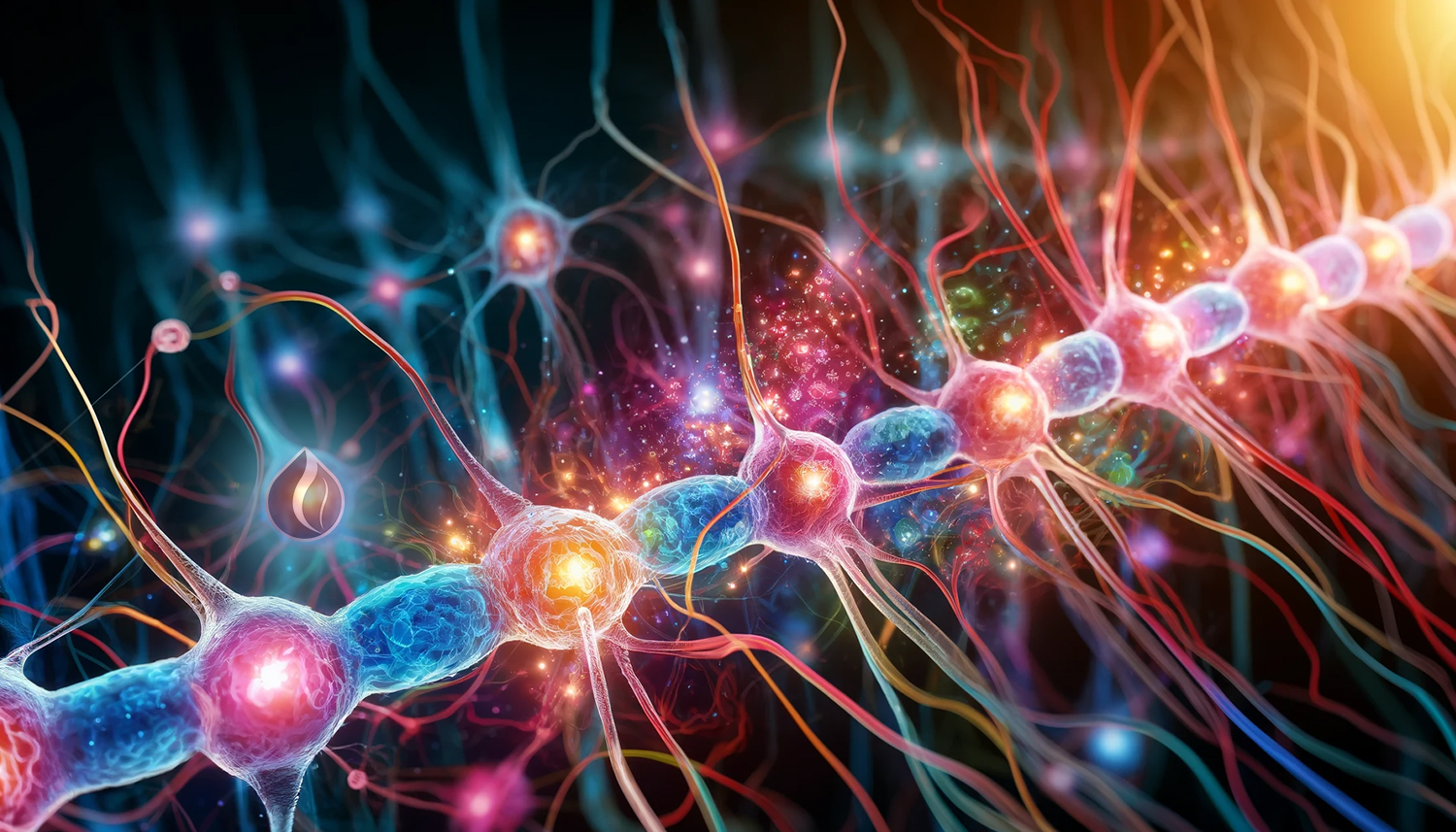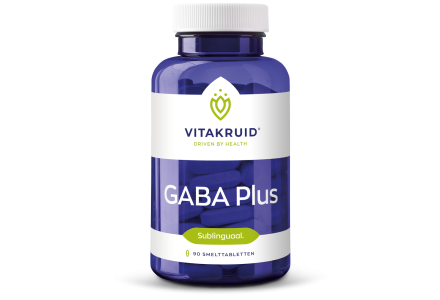
Welcome to our extensive blog about GABA and your health! In this blog we take a closer look at gamma-aminobutyric acid (GABA), an important neurotransmitter in your body that plays a crucial role in various aspects of your physical and mental well-being. From regulating stress and anxiety to promoting restful sleep, discover how GABA can be an essential factor for a healthy and balanced life. Let's dive into the world of GABA together and explore its impact on your overall health.
What is GABA and how does it work?
GABA, also called Gamma-aminobutyric acid, is an amino acid that occurs in all organisms.
An amino acid is an organic compound that is essential for building proteins in living organisms. Proteins are a fundamental part of cells and play a crucial role in many biological processes, such as building and maintaining tissue, regulating enzymatic reactions and functioning of the immune system.
However, not all amino acids are building blocks for proteins, but they can also have other biological functions. Some amino acids, such as GABA, function as neurotransmitters in the nervous system, while others are involved in transporting molecules and regulating enzymatic reactions. Neurotransmitters are chemical messengers that transmit signals between nerve cells, also called neurons. GABA has specific functions and is involved in various processes in the nervous system.
It is important to get enough amino acids through a balanced diet to support overall health and well-being.
We distinguish between essential and non-essential amino acids. The first group cannot be produced by the body and must therefore be obtained through diet. The second group can be synthesized by the body itself. Although GABA belongs to the second group, GABA deficiencies can still occur. There are several reasons for this:
Genetic predisposition: Some people may have genetic variations that lead to reduced production or activity of GABA or the enzymes involved in GABA synthesis. This can result in lower GABA levels in the body.
Stress and anxiety: Chronic stress and anxiety can lead to a disruption of the balance between excitation (for example by glutamate) and inhibition (by GABA) in the nervous system. This can lead to an increased need for GABA to regulate the stress response, meaning that available GABA levels may not be sufficient.
Neurological disorders: Some neurological disorders, such as epilepsy, may be associated with impaired GABAergic neurotransmission. In these cases, the normal functioning of GABA can be disrupted, leading to a functional deficiency, even if the absolute levels of GABA in the body are not necessarily low.
Age: With aging, changes in the nervous system can occur that affect GABA activity. This can result in decreased GABA function, which can be associated with symptoms such as sleep problems or anxiety in some people.
The health benefits of GABA: from mind to body
GABA is known as an inhibitory neurotransmitter. This means that it reduces the activity of nerve cells. It acts on specific receptors on the surface of neurons, reducing the excitation or stimulation of these cells. Because of this, GABA has several potential health benefits, both for the mind and body. Below we briefly list some of the most important possible benefits:
Stress reduction and anxiety: GABA is known for its calming effects on the nervous system. It can help reduce stress and anxiety by decreasing the activity of neurons, creating a feeling of relaxation. This can be beneficial for people dealing with stress-related conditions.
Improved sleep quality: GABA plays a role in promoting relaxation and regulating sleep patterns. GABA supplements are sometimes used to improve sleep quality, especially by people who have trouble falling asleep or who suffer from insomnia.
Mood stabilization: Through its effects on neurotransmitter activity, GABA can help stabilize mood. It can be helpful in reducing mood swings and improving overall emotional well-being.
Muscle cramp relief: GABA can have a relaxing effect on muscles, so it can help reduce muscle cramps and tension. This can be especially beneficial for people who regularly suffer from muscle pain or tension.
Improved focus and concentration: Although GABA is primarily known for its calming effects, it can also improve focus and concentration by balancing the activity of neurons. Some people experience increased mental clarity and alertness after taking GABA supplements.
Natural sources of GABA: food that nourishes your brain
Natural sources of GABA include leafy vegetables, soybeans and broad beans, nuts and seeds (such as walnuts, almonds and sunflower seeds), tomatoes and eggs. Also, some teas, especially black and green tea, may contain GABA.
Additionally, adding more healthy bacteria to your diet is a relatively easy way to support GABA production. This can be done by consuming fermented foods. Consider, for example, fermented soy products such as miso, tempeh and natto. You can also use fermented dairy products, such as kefir and fermented yogurt. And also fermented vegetables, such as kimchi.
GABA Supplements: Everything You Need to Know
GABA is also available in the form of supplements. These contain a concentrated form of GABA that can be absorbed by the body. Particularly in managing stress and supporting good sleep, it can supplement the GABA amount that the body produces or receives from food.
Meditech Europe offers a GABA supplement as GABA Plus in the form of a melting tablet. In addition to GABA, this also contains magnesium (taurate) and vitamin B1
However, it is important to note that the effects of GABA supplements vary somewhat between individuals. In addition, you should use caution when using supplements and always consult with a healthcare provider, especially if you are already taking other medications or have health problems. It is also good to remember that diet and lifestyle (such as exercise) also play a major role in promoting a healthy mind and body.
Meditech Europe is ready to advise and guide you in discovering the world of nutritional supplements. You can contact us at info@meditecheurope.nl or +31527 292 331.
GABA and sleep: a deep dive into the night
GABA plays an important role in regulating sleep and promoting a good night's sleep. GABA allows the body and mind to relax and fall asleep and to sleep through the night and can therefore be considered a natural sleep aid. This is due to the inhibitory effect of this neurotransmitter on neural activity in the brain, which ensures relaxation and a calming effect.
GABA also plays a role in the sleep cycle. The sleep cycle consists of several stages, including light sleep, deep sleep (slow-wave sleep), and REM (Rapid Eye Movement) sleep. GABA is involved in the regulation of these sleep stages, particularly in promoting deep sleep and relaxation. This phase is essential for physical recovery, cell regeneration and strengthening the immune system. GABA also plays a role in regulating REM sleep, where dreaming mainly occurs. GABA's inhibitory effect can help prevent over-arousal during this phase, which is essential for cognitive processing and emotional well-being.
The role of GABA in stress and anxiety management
As mentioned earlier, GABA plays a crucial role in managing stress and anxiety. As an inhibitory neurotransmitter, GABA has a calming effect on the nervous system and helps regulate neurons involved in emotional responses.
GABA has an inhibitory effect on neurons, which helps reduce excessive neural activity that can lead to anxiety and stress responses.
In addition, GABA is essential for regulating anxiety responses in the brain. Low levels of GABA or impaired GABA function can lead to increased excitability of neurons and hypersensitivity to stressful situations.
GABA also interacts with other systems in the body involved in the stress response, such as the sympathetic nervous system. Enhancing GABA activity can help modulate these stress systems, improving the body's ability to cope with stressful situations and recover from stress.
FAQ
Can I Increase My GABA Levels Naturally Without Supplements?
Yes, you can increase your GABA levels naturally without supplements through a healthy lifestyle. This includes regular exercise, stress management techniques such as meditation and yoga, adequate sleep and a balanced diet containing foods rich in GABA as well as magnesium, zinc and vitamin B6 (which are involved in GABA synthesis), and avoiding excessive alcohol and caffeine use.
Are there any side effects associated with taking GABA supplements?
In general, GABA supplements are considered safe and well tolerated when used according to recommended dosages. Some possible mild side effects in some people may include mild drowsiness, dizziness, nausea, or stomach upset. It is important to talk to a healthcare provider before taking GABA supplements if you are taking other medications or have health problems.
How do I know if I am GABA deficient?
It is difficult to immediately determine whether you are GABA deficient because there are no specific tests to measure GABA levels in the brain. However, if you experience symptoms such as persistent anxiety, sleep problems, irritability, nervousness, or mood swings, it may indicate an imbalance in your GABA system. It is best to consult an expert when in doubt.





